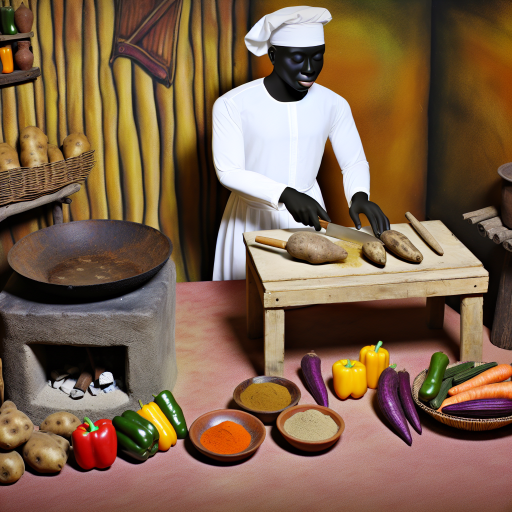Introduction
How traditional Nigerian steaming preserves essential potassium for better health plays a vital role in maintaining human health.
It aids in muscle contractions and nerve function.
Additionally, it helps regulate blood pressure and fluid balance.
Many people, however, do not consume sufficient potassium.
Traditional Nigerian cooking methods can address this deficiency effectively.
Nigerian cuisine often employs steaming as a primary cooking method.
This technique not only enhances flavor but also preserves nutrients.
Steaming involves cooking food by surrounding it with steam, which retains essential elements.
Unlike boiling, steaming minimizes nutrient loss during preparation.
This blog post aims to explore how traditional Nigerian steaming methods preserve potassium.
It will highlight their health benefits and importance in a balanced diet.
Potassium Preservation in Steaming
Steaming food prevents the leaching of potassium found in vegetables and grains.
When boiled, much of the potassium dissolves into the water.
However, steaming keeps potassium locked within the food, promoting better health outcomes.
Traditional Nigerian dishes often include rich sources of potassium, such as leafy greens and tubers.
By steaming these ingredients, cooks maximize the retention of this essential mineral.
Popular steamed dishes, such as Efo Riro and Moi Moi, thus deliver higher potassium content.
Health Benefits
Incorporating potassium-rich foods into your diet has numerous health benefits.
Adequate potassium intake supports cardiovascular health by regulating blood pressure.
It also reduces the risk of stroke and kidney stones.
Furthermore, potassium is essential for muscle recovery after exercise.
Through traditional Nigerian steaming methods, individuals can enjoy delicious meals packed with nutrients.
This practice not only enriches diets but also honors culinary heritage.
As awareness grows about nutrition, embracing these methods can contribute to better overall health.
In fact, traditional Nigerian steaming preserves potassium effectively.
This age-old technique supports health and well-being while celebrating Nigerian culture.
Incorporating these practices into daily meals creates a delicious path to better health.
Understanding Potassium and Its Health Benefits
Potassium is an essential mineral that plays a critical role in various bodily functions.
It helps regulate fluids, muscle contractions, and nerve signals.
Understanding potassium’s significance is crucial for maintaining overall health.
The Role of Potassium in the Body
Potassium is vital for several reasons.
Here are some key roles it plays:
- Fluid Regulation: Potassium helps maintain fluid balance in and around cells.
- Muscle Contractions: It aids in the contraction and relaxation of muscles, including the heart.
- Nerve Signals: Potassium facilitates the transmission of nerve impulses.
Each of these functions is essential for our daily activities.
A deficiency in potassium can lead to various health issues, affecting muscles and overall body functions.
Health Benefits of Adequate Potassium Intake
Consuming adequate potassium provides many health benefits.
Key advantages include:
- Blood Pressure Regulation: Potassium helps lower blood pressure by balancing sodium levels.
- Cardiovascular Health: It supports heart function and reduces the risk of heart disease.
- Kidney Stone Prevention: Adequate potassium lowers the risk of kidney stones by reducing calcium excretion.
- Bone Health: It may help prevent osteoporosis by reducing bone mineral loss.
- Muscle Strength: Proper levels of potassium improve muscle strength and function.
These benefits highlight the importance of sufficient potassium intake for optimal health.
Individuals should prioritize foods rich in this mineral to enjoy these advantages.
Recommended Daily Intake of Potassium
Different age groups and demographics have varying potassium needs.
Here are some general guidelines:
- Adults (19 years and older): 2,600 to 3,400 mg per day, depending on sex and activity level.
- Children (1-3 years): 2,000 mg per day.
- Children (4-8 years): 2,300 mg per day.
- Adolescents (9-13 years): 2,500 to 4,500 mg per day.
- Pregnant Women: 2,900 mg per day.
- Lactating Women: 2,800 mg per day.
These recommendations may vary based on individual health conditions and lifestyle.
Consult healthcare providers for personalized advice on potassium intake.
Unlock the Power of Nigerian Food Minerals
Discover personalized Food Advisory tailored to boost your health or business using expert insights on Nigerian minerals.
Get StartedIncorporating potassium-rich foods into daily meals can help meet these recommendations.
Traditional Nigerian steaming techniques, for example, preserve potassium levels effectively in food.
This aligns cultural dietary practices with health benefits.
Traditional Nigerian Foods Rich in Potassium
Nigeria’s rich culinary heritage includes a variety of ingredients abundant in potassium.
These foods not only provide essential nutrients but also contribute to the country’s cultural identity.
Here, we will explore the traditional foods that are high in potassium, their nutritional profiles, and their cultural significance in Nigerian cuisine.
Overview of Traditional Nigerian Foods High in Potassium
Several traditional Nigerian foods are excellent sources of potassium.
These foods often form the basis of many meals and contribute significantly to nutritional well-being.
Here’s a list of some of the most potassium-rich foods found in Nigerian cuisine:
- Plantains: A versatile starchy fruit, used in many forms, from boiled to fried.
- Yams: A staple food, often prepared in various ways, including pounded yam and yam porridge.
- Beans: Nutrient-dense legumes that serve as a primary protein source in many Nigerian households.
- Leafy Greens: Varieties like spinach and bitter leaves are common in stews and soups.
- Groundnuts: Often used in snacks and sauces, they are high in potassium and healthy fats.
- Sweet Potatoes: A sweet alternative to yams, loaded with potassium and dietary fiber.
- Pumpkin Leaves: These leaves are often included in soups and stews, providing valuable nutrients.
Nutritional Profiles of These Foods
Understanding the nutritional profiles of these potassium-rich foods allows us to appreciate their health benefits.
Here is a closer look at their potassium content:
- Plantains: One medium-sized plantain contains about 500 mg of potassium.
This nutrient helps regulate blood pressure and improves heart health. - Yams: A medium serving can provide approximately 600 mg of potassium.
This makes yams a powerful choice for promoting overall wellness. - Beans: A cup of cooked beans can contain about 600-700 mg of potassium.
They are also an excellent source of protein and fiber. - Leafy Greens: A cup of cooked spinach provides around 840 mg of potassium.
They enhance blood circulation and are vital for proper bodily functions. - Groundnuts: A handful contains about 200-400 mg of potassium.
Their healthy fat content contributes to heart health. - Sweet Potatoes: A medium sweet potato has around 440 mg of potassium.
Their natural sweetness makes them popular in various dishes. - Pumpkin Leaves: These are low in calories and high in potassium.
A cup cooked can offer about 800 mg of potassium.
Including these foods in your diet enriches your potassium intake.
Consuming foods high in potassium can lower blood pressure and reduce muscle cramps.
Moreover, they support nerve function and help maintain electrolyte balance.
Cultural Significance of These Foods in Nigerian Cuisine
The cultural significance of these potassium-rich foods runs deep in Nigeria.
They are not only dietary staples but also integral to many rituals and celebrations.
Here are some cultural aspects associated with these foods:
- Plantains: Often served at gatherings, they symbolize abundance and hospitality.
- Yams: Present during festivals, they represent fertility and prosperity.
The “new yam festival” celebrates the harvest. - Beans: Commonly eaten during local festivities, they are prepared in a variety of dishes.
- Leafy Greens: Often incorporated in traditional medicine, they signify health and wellness.
- Groundnuts: Associated with snacks and social gatherings, they enhance communal bonding.
- Sweet Potatoes: Their use in meals is widespread, making them a comforting food for many households.
- Pumpkin Leaves: Frequently grown in home gardens, they symbolize sustainability and self-sufficiency.
Through traditional cooking methods, these foods are often steamed or boiled, preserving their potassium content and other nutrients.
The use of steaming in Nigerian cuisine not only maintains nutritional value but also enhances flavors.
Emphasizing the cultural practices associated with these foods enriches our understanding of their significance in everyday life.
Moreover, these foods provide a tangible connection to Nigerian heritage.
Cooking techniques and recipes have been passed down through generations, preserving the knowledge of nutrition and health.
Families gather to celebrate meals made with these foods, reinforcing communal ties and cultural identity.
In short, traditional Nigerian foods rich in potassium are essential for both health and cultural identity.
Incorporating these foods into your diet can significantly impact overall well-being.
The potassium-rich options available from plantains, yams, beans, and leafy greens do more than nourish the body; they strengthen cultural bonds and celebrate rich culinary traditions.
Exploring these foods offers a glimpse into Nigeria’s vibrant culture and the importance of nutrition in enhancing health.
Read: Traditional Nigerian Food Practices That Enhance Mineral Health
Traditional Steaming Methods in Nigeria
Steaming is a remarkable culinary technique that preserves essential nutrients in food.
In Nigeria, traditional steaming methods showcase the ingenuity of local cooks.
The steaming process utilizes various tools and practices unique to Nigerian culture.
This section will delve into the traditional steaming methods, comparing them to other cooking techniques and exploring their significance in Nigerian culinary history.
Description of the Traditional Steaming Process and Tools Used
Nigerian steaming involves simple yet effective tools.
Cooks commonly use a large pot filled with water and cover it with a steaming basket.
The steaming basket often consists of bamboo or plant materials.
This method allows steam to circulate while keeping food above the water level.
For certain dishes, Nigerian cooks use hot stones.
They place heated stones inside a pot of water, creating steam.
The steam cooks food evenly without direct contact with boiling water.
This method is particularly popular in rural communities, where resources are limited.
Some other traditional tools include:
Captivate Your Audience with Exclusive Nigerian Food Content
Imagine your platform enriched with unique, mineral-rich Nigerian cuisine stories that no one else can offer. Let's create content that resonates deeply and sets you apart.
Get Started- Plantain leaves: Used for wrapping food, providing flavor and moisture.
- Clay pots: Traditionally made, they retain heat efficiently and enhance flavor.
- Metal steaming racks: Common in urban areas, they allow food to be stacked for efficient cooking.
The steaming process is straightforward:
- Fill a large pot with water, ensuring it does not touch the steaming basket.
- Arrange the food in the steaming basket and cover it with a lid.
- Bring the water to a gentle boil, allowing the steam to cook the food.
- Monitor the cooking time based on the type of food.
This method allows cooks to achieve tender and flavorful meals while retaining nutrient density.
Comparison with Other Cooking Methods in Terms of Nutrient Preservation
When compared to boiling, steaming is the superior choice for preserving nutrients.
Boiling often leads to nutrient loss in water, especially if it is discarded.
Many vitamins, particularly water-soluble ones, leach out during boiling.
Frying, while adding flavor and crispiness, does not prioritize nutrient preservation either.
The high temperatures and the cooking oil can degrade essential nutrients.
In contrast, steaming keeps nutrients intact due to the lower temperatures and the absence of water contact.
Here’s a summary of nutrient preservation for different methods:
- Steaming: Minimizes nutrient loss, maintains texture and flavor.
- Boiling: Significant nutrient loss, especially water-soluble vitamins.
- Frying: Higher nutrient loss due to heat and oil degradation.
Various studies confirm that steaming keeps up to 90% of nutrients intact, making it the healthiest option.
For example, steaming vegetables significantly preserves vitamin C levels.
In fact, steaming retains more color and crunch, further enhancing the food’s appeal.
Significance of Steaming in Nigerian Culinary History and Practices
Steaming plays a fundamental role in Nigerian culinary traditions.
It connects health and cultural practices through generations.
Many Nigerian dishes rely on steaming to achieve their distinctive flavors and textures.
For instance, foods such as yam and vegetables are often steamed to enhance flavor without losing essential nutrients.
Traditional meals like moi moi—a bean pudding—rely on steaming to achieve their unique consistency and rich taste.
Furthermore, steaming emphasizes communal eating, an integral part of Nigerian culture.
Families often gather to share steamed dishes, reinforcing bonds and traditions.
The act of preparing and enjoying steamed meals together creates lasting memories and collective identity.
In rural areas, steaming demonstrates sustainability and resourcefulness.
This method reduces waste by utilizing local, plant-based materials that are biodegradable.
It also consumes less energy than other cooking methods, showcasing environmental awareness.
The practice of steaming also has health implications.
With a growing awareness of nutrition, many Nigerians are returning to traditional cooking methods.
Health-conscious individuals prefer steaming for its health benefits.
It allows them to enjoy flavorful meals without excess oil or sodium.
Traditional Nigerian steaming methods effectively preserve essential potassium and other nutrients.
This cooking technique highlights the cultural richness of Nigeria’s diverse culinary history.
By emphasizing the importance of these methods, we can promote healthier eating habits for future generations.
In Nigeria, steaming serves not just as a cooking technique but as a cultural practice, bridging generations.
It preserves essential nutrients and emphasizes communal bonds during meal preparation.
Hence, traditional steaming remains a valuable aspect of Nigerian culinary heritage, deserving appreciation and recognition.
Read: Prevent Diseases With Mineral-Rich Nigerian Foods

The Science of Steaming and Nutrient Preservation
Cooking methods significantly influence the nutrient content of our food.
Traditional Nigerian steaming techniques play a vital role in this context.
These methods preserve potassium levels in foods more effectively than many other cooking methods.
In this section, we will delve into the science behind steaming and its benefits for nutrient preservation.
The Science of Steaming and Nutrient Preservation
Steaming is an excellent cooking method that minimizes nutrient loss, particularly potassium.
This practice has been integral to Nigerian cuisine for generations.
It allows food to cook thoroughly while retaining essential vitamins and minerals.
How Steaming Preserves Potassium
Potassium is crucial for maintaining a healthy body.
It helps regulate fluid balance, nerve signals, and muscle contractions.
Here’s how steaming ensures better preservation of potassium compared to other cooking methods:
- Temperature Control: Steaming operates at lower temperatures than boiling.
Lower temperatures reduce the likelihood of nutrient degradation. - Short Cooking Time: Foods typically steam for shorter durations, thereby limiting exposure to heat and preserving potassium.
- Minimal Water Usage: Unlike boiling, steaming uses minimal water, preventing potassium from leaching out.
- Direct Steam Application: Steam directly cooks the food, which reduces nutrient loss through chemical reactions with water.
Other cooking methods, such as frying or boiling, often result in substantial potassium loss.
Frying generally involves higher temperatures that can destroy sensitive nutrients.
Boiling can cause potassium to leach into the cooking water, resulting in significant nutrient loss.
Steaming offers an effective alternative that maintains potassium levels.
The Role of Steam in Maintaining Nutrient Integrity
Steam plays a pivotal role in preserving the integrity of vitamins and minerals in food.
When you steam vegetables or grains, you create a controlled environment that facilitates cooking without losing essential nutrients.
Here’s how steam preserves vitamin and mineral integrity:
- Heat Distribution: Steam evenly distributes heat, ensuring uniform cooking.
This process helps maintain nutrient levels throughout the food. - Reduced Oxidation: Steaming minimizes the exposure of food to oxygen, significantly reducing oxidation, which can lead to nutrient degradation.
- Preservation of Color and Texture: Steaming retains the vibrant colors and textures of food, which is often an indicator of nutrient density.
- Lower pH Levels: The acidic environment created during steaming can help preserve sensitive vitamins.
Overall, steam serves as a gentle cooking agent that protects nutrients effectively.
Using steaming as a cooking method can yield healthier meals that retain their natural health benefits.
Research Studies on Cooking Techniques and Nutrient Retention
Multiple studies highlight the effects of cooking techniques on nutrient retention, particularly potassium levels.
Research consistently shows that steaming is superior to many cooking methods.
Here are key findings:
- Study on Vegetables: A study published in the “Journal of Food Science” indicated that steaming preserved 90% of thiamine and riboflavin in vegetables, compared to boiling.
- Nutrient Preservation Research: A 2010 study found that steaming broccoli preserved up to 90% of its vitamin C content, while boiling only retained about 50%.
- Potassium Retention: Research by the USDA demonstrated that steamed potatoes retained nearly all of their potassium compared to boiled potatoes, which lost a significant portion.
- Broccoli Analysis: The “International Journal of Food Sciences and Nutrition” highlighted that steamed broccoli had higher levels of potassium than its boiled counterpart.
These studies indicate a clear consensus on the benefits of steaming.
The research emphasizes that steaming is not just a culturally traditional cooking method, but also a scientifically backed option for nutrient preservation.
Such findings encourage better cooking practices for health-conscious individuals.
In essence, traditional Nigerian steaming methods play an essential role in preserving potassium and other important nutrients.
Steaming offers a cooking method that is both effective and healthy.
Science assures us that steaming enhances the nutritional profile of food.
By incorporating these practices into our daily routines, we can enjoy the numerous health benefits they bring.
As we continue to explore traditional cooking methods, it is imperative to recognize their importance in modern nutrition.
Read: Effective Tips for Better Mineral Absorption in Nigerian Meals
Practical Tips for Steaming Traditional Dishes
Steaming is a traditional cooking method that preserves nutrients exceptionally well.
It retains essential minerals and vitamins, especially potassium, crucial for overall health.
This guide provides a step-by-step approach to steaming high-potassium Nigerian dishes while enhancing their flavors.
Embrace these tips to revolutionize your culinary experience!
Step-by-step Guide to Preparing High-Potassium Nigerian Dishes Using Steaming
Here’s how to steam delicious traditional Nigerian dishes while maximizing potassium content:
- Choose high-potassium ingredients: Integrate foods like yam, plantain, and sweet potatoes.
These ingredients provide a rich potassium source. - Gather necessary equipment: Use a steaming pot, bamboo steamer, or any heatproof container.
Ensure you have a lid and water for steaming. - Prepare your vegetables: Clean and chop them into uniform pieces.
This ensures even cooking, which is vital for nutrient retention. - Soak if necessary: For some vegetables, soak them briefly in water.
This helps in removing dirt and enhances their texture. - Add water to the pot: Fill the steaming pot with water, ensuring it does not touch the bottom of the steaming basket.
This prevents direct contact with water. - Arrange your food: Place well-prepared ingredients in the steamer.
Avoid overcrowding to allow steam to circulate freely. - Cover the pot: Use a tight-fitting lid to trap steam.
This minimizes the loss of nutrients and enhances cooking speed. - Set the timer: Steam vegetables for about 10-20 minutes, depending on their density and size.
Check for doneness by piercing with a fork. - Serve promptly: Remove the steamed food and serve immediately.
This preserves flavors and nutrients.
Enhancing Flavors While Preserving Nutrients
To enhance the taste of steamed dishes while maintaining nutrients, consider the following:
- Salt lightly: A pinch of salt before steaming enhances flavor.
Avoid excess salt to maintain health benefits. - Add herbs: Use fresh or dried herbs like thyme, basil, or oregano for rich flavors.
They complement traditional Nigerian dishes brilliantly. - Incorporate spices: Spices such as ginger and garlic impart depth.
They also offer additional health benefits. - Infuse flavors with sauces: Steam vegetables with a splash of your favorite sauce.
This allows flavors to penetrate without losing essential nutrients. - Finish with citrus: A squeeze of lemon or lime juice adds freshness to steamed dishes.
It enhances flavor while providing additional vitamin C.
Suggestions for Modern Adaptations of Traditional Steaming Methods
Emphasizing the practicality of steaming, consider adapting traditional methods with modern techniques to suit your lifestyle:
- Use electric steamers: These devices simplify the steaming process.
They often come with timers and auto shut-off features for convenience. - Experiment with multi-cookers: Multi-cookers allow you to steam alongside other cooking methods.
Cook rice and vegetables simultaneously for efficiency. - Try microwave steaming: Use microwave steam bags for quick meals.
This method is time-saving while retaining nutrients. - Incorporate Asian steaming traditions: Utilize bamboo steamers, which add unique texture and flavor to foods.
They allow for creative presentations too. - Utilize wraps: Try steaming food in banana leaves or parchment paper.
This adds an earthy flavor and retains moisture well.
Adapting these practices makes it easier to enjoy healthy, nutrient-dense meals, preserving the potassium content critical for health.
Steaming is a powerful method that preserves potassium and enhances the flavors of traditional Nigerian dishes.
By following the outlined steps and incorporating creative enhancements, you can achieve delicious, healthy meals easily.
Explore modern adaptations to streamline your cooking process while experiencing the benefits of traditional practices.
Enjoy the journey towards better health through the age-old method of steaming!
Health Challenges Related to Low Potassium Levels
Potassium plays a vital role in maintaining overall health.
It contributes significantly to various bodily functions.
A deficiency in potassium can lead to several health challenges.
Understanding these risks is essential for promoting better health.
Overview of Health Risks Associated with Potassium Deficiency
Low potassium levels can result in serious health issues.
Here are some common health risks associated with potassium deficiency:
- Hypertension: Insufficient potassium can lead to increased blood pressure.
Potassium helps balance sodium levels in the body.
When sodium is unregulated, it can cause hypertension. - Muscle Weakness: Potassium is crucial for muscle function.
A deficiency can result in muscle weakness, cramps, and spasms. - Fatigue: Low potassium levels often contribute to feelings of fatigue.
This can impact daily activities and overall productivity. - Heart Issues: Potassium is essential for proper heart function.
A deficiency may lead to irregular heartbeats or arrhythmias. - Kidney Problems: Without adequate potassium, kidney function may decline.
Kidneys play a pivotal role in regulating potassium levels. - Nervous System Disorders: Potassium is necessary for nerve function.
Low levels can lead to issues with nerve transmission.
Recognizing these potential health risks emphasizes the importance of maintaining adequate potassium levels.
Common Dietary Habits That May Lead to Low Potassium Intake in Nigerian Communities
Several dietary habits may result in low potassium intake among Nigerian communities.
Here are some notable factors contributing to this issue:
- High Consumption of Processed Foods: Processed foods are often low in potassium.
These items frequently contain high levels of sodium, which can lead to imbalances. - Poor Diet Choices: A diet lacking in fruits and vegetables can harm potassium intake.
Many traditional diets may not prioritize these nutrient-dense foods. - Preference for Sodium-Rich Seasonings: Common seasonings like salt can overpower potassium-rich foods.
This preference can lead to inadequate potassium consumption. - Limited Awareness of Nutritional Needs: Many individuals may not recognize the importance of potassium.
A lack of education around dietary choices can worsen the situation. - Economic Barriers: Financial constraints can hinder access to fresh produce.
Many families may find it challenging to purchase potassium-rich foods.
Addressing these dietary habits is essential to improving potassium intake in Nigerian communities.
Strategies to Incorporate More Potassium-Rich Foods into Daily Meals
Incorporating more potassium-rich foods into daily meals is crucial for fighting deficiency.
Here are practical strategies to enhance potassium intake:
- Incorporate More Fruits: Fruits like bananas, oranges, and avocados are rich in potassium.
Make these fruits a regular part of your diet. - Add Vegetables: Leafy greens, sweet potatoes, and tomatoes provide ample potassium.
Including these in your meals can boost potassium levels. - Snack Wisely: Choose potassium-rich snacks like nuts and seeds.
These options can be healthy and satisfying between meals. - Use Natural Seasonings: Replace high-sodium seasonings with herbs and spices.
These not only enhance flavor but also preserve potassium content. - Educate Communities: Host workshops to inform people about potassium’s benefits.
Increase awareness of foods that provide this essential mineral. - Access to Fresh Produce: Promote local farming initiatives.
Enhancing access to fresh fruits and vegetables can improve overall dietary quality. - Cooking Methods: Opt for steaming and boiling to retain potassium in food.
Traditional Nigerian steaming methods can help preserve this vital mineral.
By implementing these strategies, individuals and communities can begin to see improvements in potassium intake.
Low potassium levels pose serious health challenges.
Understanding these risks can incite action within Nigerian communities.
Improving dietary habits and incorporating potassium-rich foods is essential.
With more awareness and practical strategies, it is possible to enhance health and well-being.
Conclusion
Potassium is a vital mineral that supports numerous bodily functions.
It helps regulate fluid balance, muscle contractions, and nerve signals.
Adequate potassium intake plays a crucial role in maintaining heart health and blood pressure.
Traditional Nigerian steaming techniques help preserve this essential mineral in a way that modern cooking methods often cannot.
Through steaming, vegetables retain their natural flavors and maximum nutrient content.
This gentle cooking method prevents the loss of potassium often seen in boiling or frying.
For example, steaming vegetables like spinach, yams, and okra helps maintain their nutritional value while making them deliciously tender.
Adopting traditional Nigerian steaming practices can significantly enhance your dietary potassium levels.
By incorporating steamed dishes into your meals, you can improve your overall health.
This culinary method promotes well-being while allowing you to savor the authentic tastes of Nigerian cuisine.
Explore and experiment with various steaming methods in your kitchen.
Try steaming yam with a touch of pepper sauce, or enjoy leafy greens cooked to perfection.
Each dish not only nourishes the body but also embraces cultural heritage.
We encourage you to share these valuable Nigerian culinary traditions with friends and family.
These practices not only support better health but also celebrate the rich tapestry of Nigerian culture.
By embracing these time-honored methods, you contribute to a healthier lifestyle and appreciate the flavors of your heritage.
Incorporate traditional steaming into your cooking routine for improved well-being.
Doing so allows you to enjoy delicious, nutrient-rich meals while keeping your potassium levels in check.
Let the essence of Nigerian cuisine inspire your journey to better health.




